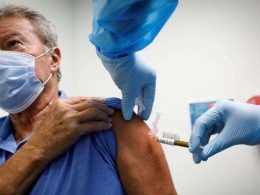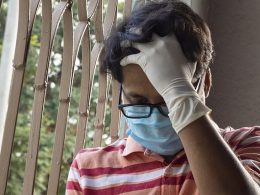A new study published by Australian researchers in the journal Virology Journal suggests that COVID-19 can remain active and infectious on banknotes, phone screens, and stainless steel among certain surfaces for 28 days. The research also found that coronavirus becomes less aggressive and less infectious on surfaces hotter than 40C within 24 hours, while it lasts longer on surfaces with cold temperatures
The lab experiment indicates that washing hands frequently and avoiding touching the mouth and face among other safety protocols become more important. Just recently, the CDC revealed that COVID-19 is airborne and can be transmitted by talking, coughing, singing, and sneezing among other oral activities. The CDC stated that the virus can remain suspended in the air for many hours and can travel beyond the 6-feet distancing recommended by health experts.
The Australian agency CSIRO researchers established that coronavirus remains active and infectious for 28 days on banknotes and plastics and glass when these items are kept in the dark and at room temperature of about 20C (68F). The scientists also said the virus lasts longer on non-porous surfaces but dies faster – within 14 days – on cloths and other porous materials.
Some health experts have disagreed with the conclusions of the study, saying it is not consistent with real-life situations. A former director at the Common Cold Centre of Cardiff University in the UK, Professor Ron Eccles, said that announcing that coronavirus can survive for 28 days is more or less an attempt to cause unnecessary public fear.
Eccles said there is no way coronavirus can reach banknotes or material surfaces except by mucus through human coughs and unwashed hands. He noted that viruses hardly survive in fresh mucus because of the natural chemicals that destroy them. He said he’d rather believe that coronavirus survives for hours in mucus rather than on material surfaces.
“Viruses are spread on surfaces from mucus in coughs and sneezes and dirty fingers and this study did not use fresh human mucus as a vehicle to spread the virus,” he said. “Fresh mucus is a hostile environment for viruses as it contains lots of white cells that produce enzymes to destroy viruses and can also contain antibodies and other chemicals to neutralize viruses. In my opinion, infectious viruses will only persist for hours in mucus on surfaces rather than days.”
Emanuel Goldman, a professor of microbiology at Rutgers University, also maintained that the chances of transmitting coronavirus through material surfaces such as banknotes and glasses or phone screens are very tiny and that the Australian study does not significantly portray real-life scenarios.
Source: bbc.com









